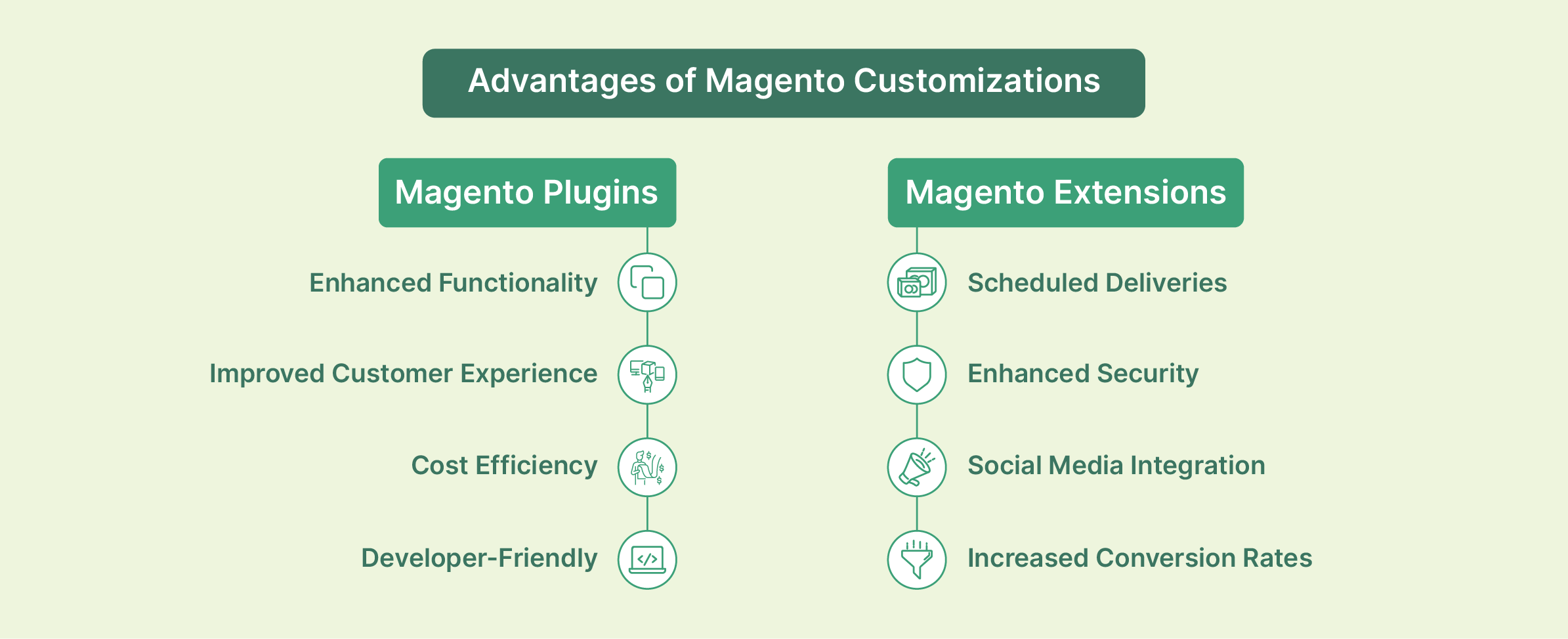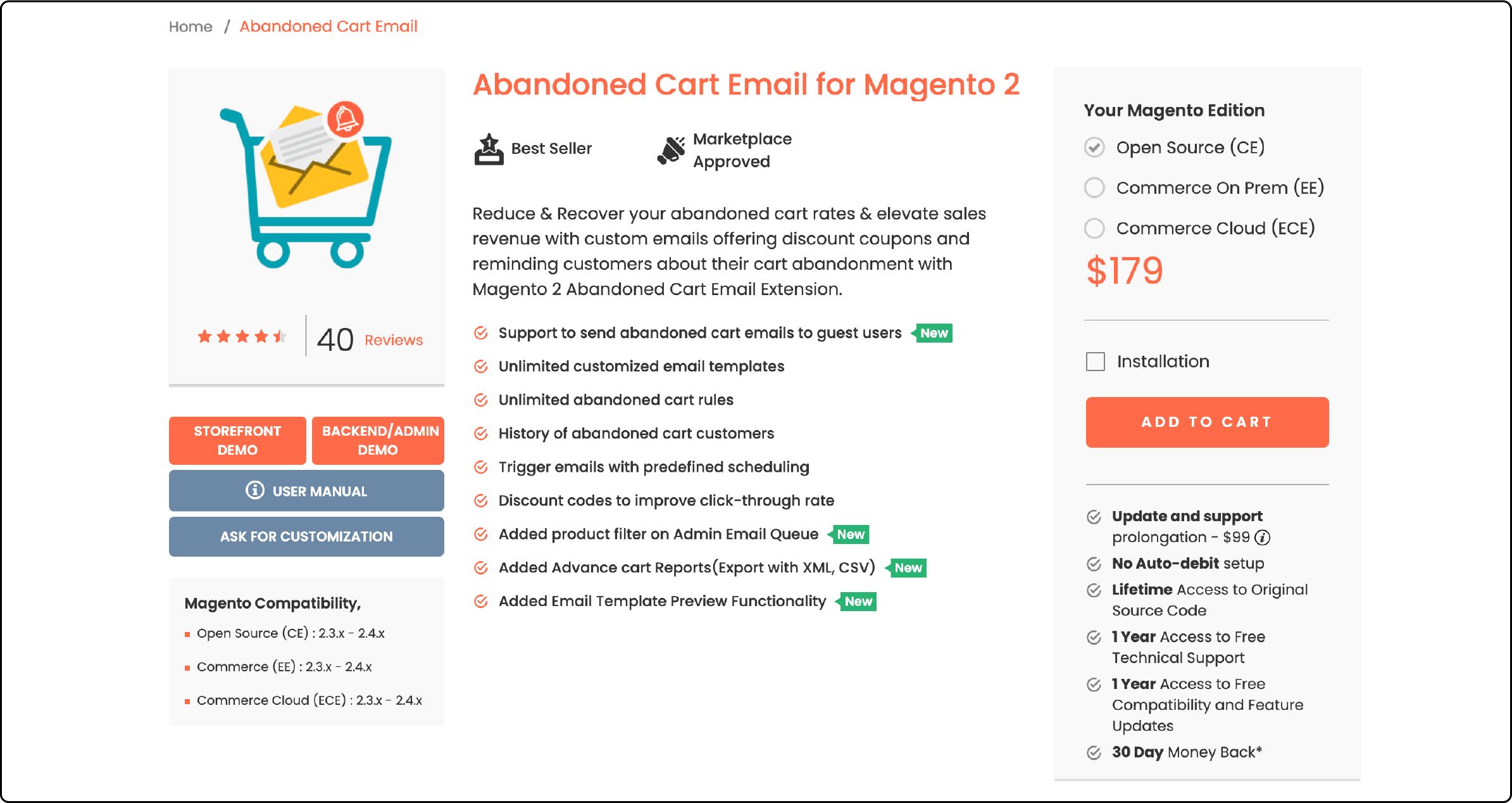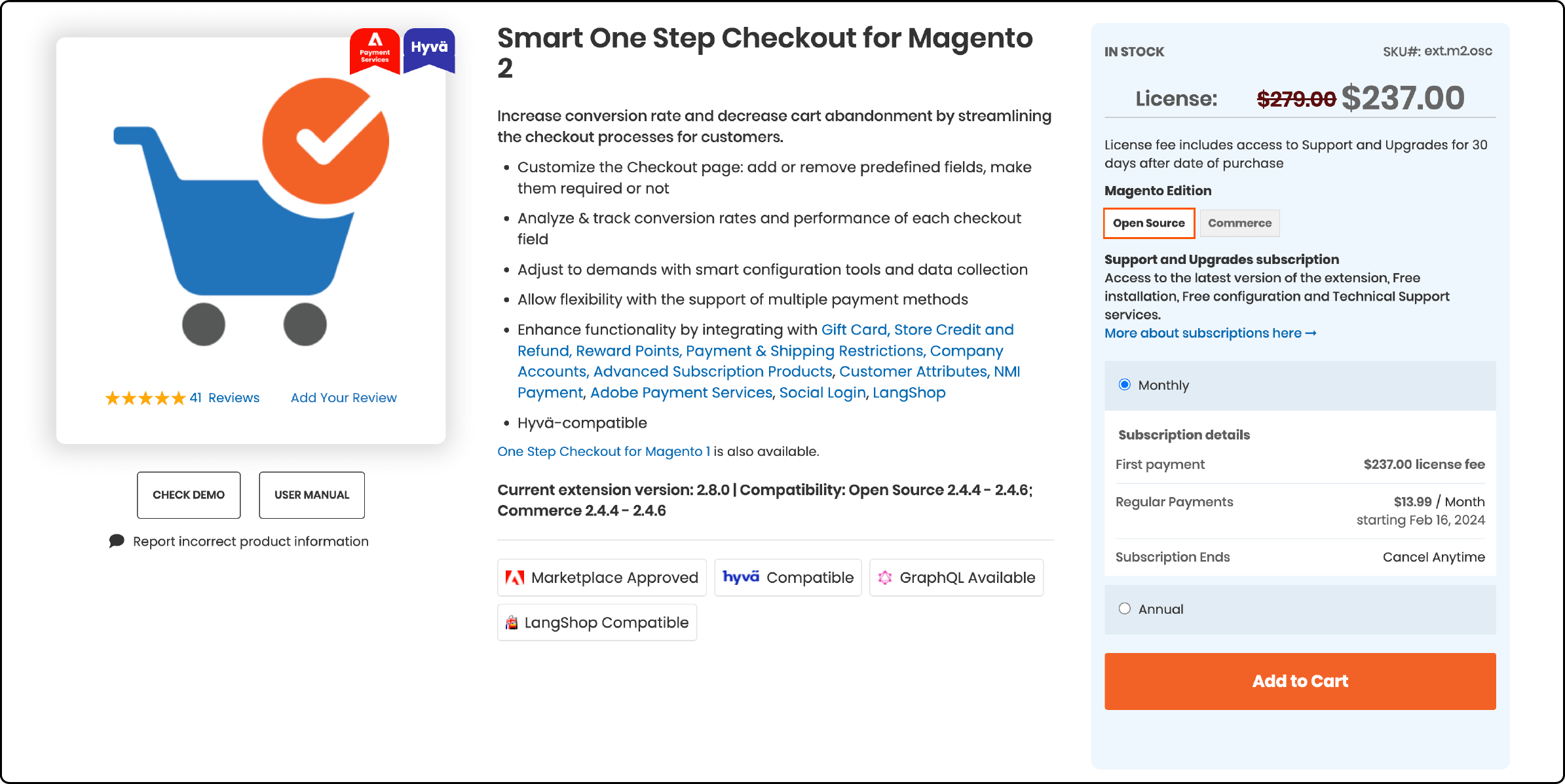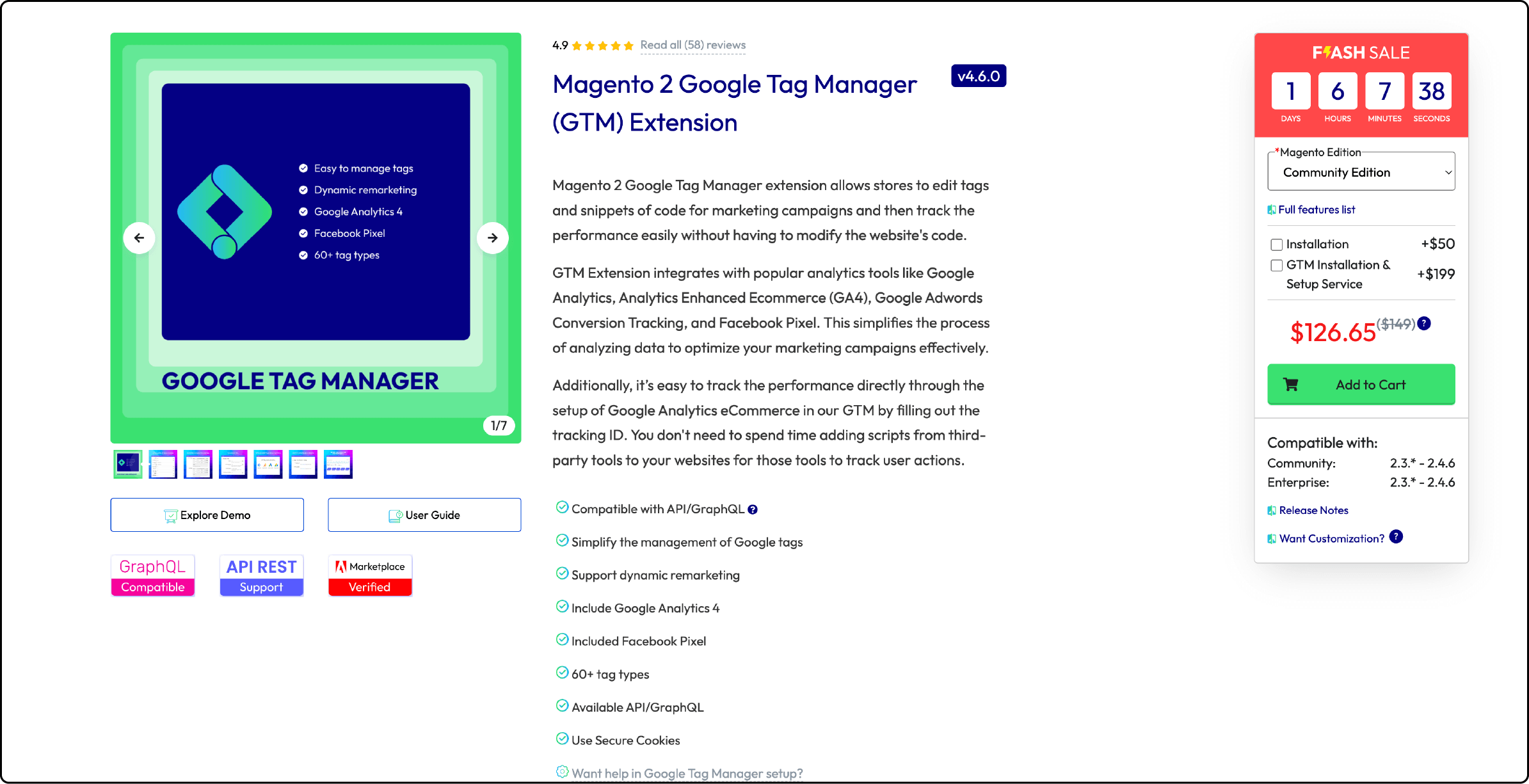
Magento Plugins vs. Magento Extensions: Differences and Examples
Magento plugins primarily serve for minor adjustments to an e-commerce's existing functionality. They are useful for customizing the checkout process or altering specific functions. On the other hand, Magento 2 extensions are comprehensive packages of code that introduce entirely new features and capabilities to a Magento 2 store. This article will explore the distinctions between Magento plugins and Magento extensions. We will help you understand their roles and purposes to make informed choices based on your needs.
-
Types of Magento Customizations: Magento Plugins and Extensions
-
Advantages of Magento Customizations: Magneto Plugins and Extensions
-
Limitations of Magento Customizations: Magento Plugins vs. Extensions
-
Tips for Optimizing Magento Plugin and Extension Performance
Key Takeaways
-
Discover the difference between Magento plugins and extensions for customization.
-
Explore the benefits of plugins for enhanced functionality and improved customer experience.
-
Learn how Magento extensions introduce specific functionalities, enhance security measures, and boost conversion rates.
-
Understand the limitations of multiple plugins and extensions and their impact on website performance.
-
Learn optimization tips for better plugin and extension performance.
What is a Magento 2 Plugin?
A Magento 2 plugin, or an interceptor, is a tool for modifying existing classes in Magento 2. It can adjust the behavior of public class functions by intercepting function calls and executing code before, after, or around them.
This approach allows you to replace or extend the functionality of original, public methods for every class or interface. With Magento 2 plugins, you can alter a class's behavior without modifying the class directly.
Using these interceptors helps prevent conflicts among extensions that modify the same class or function. Magento 2 plugins are similar to extensions, often developed by third parties.
Plugins consist of three components:
-
Type name: A class or interface observed by the plugin.
-
Plugin name: An arbitrary identifier for the plugin used for configuration integration.
-
Plugin type: The name of the plugin's virtual type or class.
What is a Magento 2 Extension?
A Magento 2 extension is a code package that adds specific functionality to Magento. It includes PHP and XML files in blocks, controllers, helpers, and models related to a particular business feature. Extensions are standalone code packages that can be customized or replaced without causing issues in other parts of the codebase. Unlike plugins, they offer complete solutions to problems, like introducing new payment gateways or shipping methods. Extensions are versatile and can be distributed and installed in Magento stores for tailored purposes.
Types of Magento Customizations: Magento Plugins and Extensions
1. Magento Plugins
-
Before Plugin: These plugins are called before an observed method in Magento. They must be named with the 'before' prefix followed by the observed method's name. ‘Before plugins’ can modify the arguments of the observed method. If changes are made, they should return an array of modified parameters. If no changes are needed, they return a null result.
-
After Plugin: After plugins are executed after the observed method is completed. They must be named after the observed method with the 'after' prefix. ‘After plugins’ can alter the initial result of the observed method and return the modified outcome.
Note: if the observed method declares a parameter as optional, the after method should do the same.
- Around Plugin: Around plugins are unique as they run both before and after their observed method. They share the same name as the observed method with the 'around' prefix. These plugins can change the original function's result based on input data. It can also disable the execution of the original function. However, it's advisable to use ‘Around plugins’ only when necessary, as they can introduce stack traces and harm performance.
2. Magento Extensions
-
Magento Marketplace Extensions: Magento has a thriving product ecosystem that enables developers to create extensions that can be found in the Magento Marketplace. This official add-on store allows users to purchase and download third-party extensions and Magento themes to enhance their online stores. To maintain quality and ensure best practices, Magento maintains an Extension Quality Program. It combines Magento expertise, development guidelines, and verification tools to assess all marketplace extensions.
-
Out-of-the-Box Extensions: Besides the extensions available in its marketplace, Magento comes pre-packaged with additional third-party Magento eCommerce extensions called Vendor Bundled Extensions. These extensions undergo thorough testing before being included with any supported version of Magento. When you install Magento, these extensions are automatically included.
-
Custom Magento Extensions: Magento has a global community of developers, resulting in various ready-to-use third-party extensions. These extensions are often affordable and easily accessible. It's advisable to seek guidance from an experienced Magento developer when incorporating third-party extensions into your store.
Note: Overloading your store with unnecessary extensions can lead to complications and performance issues.
Advantages of Magento Customizations: Magneto Plugins and Extensions

1. Magento Plugins
-
Enhanced Functionality: Magento plugins are instrumental in expanding your online store's capabilities without modifying the core Magento codebase. They introduce new Magento features and functionalities that enhance your e-commerce platform over time. For example, they can facilitate smoother checkout processes, allow users to log in, improve search options, etc.
-
Improved Customer Experience: By implementing Magento plugins, you can continually improve the user experience on your Magento website. These extensions ensure your site stays up-to-date with the latest features and capabilities, keeping your customers engaged and satisfied. It contributes to a better customer shopping experience.
-
Cost Efficiency: One of the significant advantages of using e-commerce plugins is the time and cost savings they provide. Instead of starting from scratch, you can select from a wide range of pre-built add-ons that align with your needs. As a result, your store can stand out by offering what your customers require without the extensive development time and costs.
-
Developer-Friendly: Magento 2 Interception plugins offer flexibility to module developers. They allow developers to forward method calls, modify return values, and adjust arguments for objects managed by the object manager. This flexibility is invaluable during development, enabling developers to create tailored solutions and integrate them seamlessly into the Magento environment.
2. Magento Extensions
- Scheduled Deliveries:
Some extensions bring efficiency to your e-commerce operations. For example, it allows customers to schedule preferred delivery dates and time slots for their orders. Administrators can customize delivery intervals, remotely monitor the delivery process, and efficiently manage delivery schedules. This feature enhances customer convenience and satisfaction.
- Enhanced Security:
Website security is a top priority to protect sensitive data and confidential information. Magento extensions, such as Magento 2 Security Suite and Magento 2 Google Invisible Recaptcha, provide Magento security measures. It safeguards your online store from potential cyber threats.
- Social Media Integration:
Magento 2 extensions enable seamless integration with social media platforms, allowing you to build your brand, engage with customers, and raise awareness. This integration enhances customer engagement and can attract new customers. Additionally, by tracking social media performance on your website, you can make data-driven improvements to your social media strategy.
- Increased Conversion Rates:
High Magento conversion rates indicate that many website visitors take desired actions. It includes completing forms, making online purchases, or subscribing to newsletters.
Magento extensions provide tools for creating custom forms, contact pages, shopping carts, social media sharing buttons, subscription boxes, and more. These features ultimately boost conversion rates and improve your online business's success.
Limitations of Magento Customizations: Magento Plugins vs. Extensions
1. Magento Plugins
While Magento plugins offer flexibility and utility, they come with certain limitations. Avoid using Magento 2 plugins in the following scenarios:
- Final methods and classes.
- Non-public methods.
- Class methods (including static methods).
- __construct and __destruct methods.
- Virtual types.
- Objects instantiated before Magento\Framework\Interception is initialized.
- Objects implementing Magento\Framework\ObjectManager\NoninterceptableInterface.
2. Magento Extensions
- Website Continuity:
One significant drawback of using numerous Magento extensions is the potential disruption of website continuity. Website continuity refers to the assurance that users won't encounter "Page Not Found" or error messages when navigating the site. It can lead to conflicts in code when multiple extensions rewrite the same classes. Such conflicts can result in pages crashing until the code is resolved.
- Website Security:
Installing third-party extensions carries inherent risks to website security. Since external communities often develop these extensions, ensuring their code doesn't create Magento vulnerabilities or backdoors is challenging. Third-party extensions may contain code conflicting with Magento's core code due to restrictions or protocols.
- Website Speed:
Each Magento extension brings distinct functionality and features to your e-commerce site. However, most extensions require HTTP requests to load assets like CSS, scripts, and Magento images. It's essential to assess the impact on performance when adding extensions to your site.
Tips for Optimizing Magento Plugin and Extension Performance
-
Regular Updates: Ensure your plugins and extensions are up-to-date to maintain compatibility with the latest Magento versions and requirements.
-
SEO Optimization: Implement SEO best practices within your plugins and extensions to improve search engine rankings.
-
Lazy Loading: Use lazy loading for images and content to enhance page load times and reduce the strain on the server.
-
Browser Compatibility: Ensure your plugins and extensions work seamlessly across various web browsers.
-
Streamlined Checkout: Opt for one-step checkout solutions to simplify the buying process and reduce cart abandonment rates.
-
Content Optimization: Optimize Magento images and HTML to minimize load times and improve user experience.
-
Mobile Optimization: Ensure your plugins and extensions are mobile-responsive to cater to a wider audience.
-
Review and Feedback: Encourage customer reviews and feedback to improve your products and services.
-
Category Structure: Organize your product categories effectively for easier navigation.
-
PWA Integration: Explore Progressive Web App (PWA) integration for a faster and more responsive shopping experience.
By following these optimization tips, you can enhance the performance of your Magento plugins and extensions, ultimately improving your online store's user experience, conversions, and sales revenue.
Examples of Best Magento Plugins and Extensions in 2024
1. Magento 2 Abandoned Cart Email by MageDelight

MageDelight's abandoned cart email tool is a highly dependable Magento extension. It offers numerous email templates to contact customers who have abandoned their shopping carts without making a purchase.
Features:
- Unlimited, customizable email templates.
- Unlimited customization rules.
- Scheduled emails based on predefined timelines.
- History of abandoned cart customers.
- Discount codes to improve click-through rate.
- Product filter on admin email queue.
- Advanced cart reports that can be exported with XML and CSV.
- Email template preview functionality.
Pricing: Starts at $179.
2. Smart One-Step Checkout Subscription by Aheadworks

One Step Checkout by Aheadworks streamlines the checkout process for customers. It allows merchants to customize the checkout page, resulting in more conversions and decreased cart abandonment.
Features:
- Supports multiple payment options.
- Smart configuration and data collection tools.
- Analyze and track conversion rates and performance of each checkout field.
- Flexibility with support for various payment methods.
- Integration with Gift Card, Store Credit and Refund, Reward Points, Payment and Shipping Restrictions.
- Company Accounts, Customer Attributes, NMI Payment, Adobe Payment Services, Social Login, LangShop Integration.
- Compatibility with Hyvä.
Pricing: Starts at $237.
3. Google Tag Manager & Analytics by Mageplaza

The Google Tag Manager extension by Mageplaza allows merchants to edit tags related to their marketing campaigns without performing complex source code changes. The tool works with Google Analytics to provide merchants with detailed campaign stats.
Features:
- Simplifies tag management.
- Supports dynamic remarketing.
- Integrates Google Analytics for campaign tracking.
- Compatible with API/GraphQL.
- Includes Google Analytics 4.
- Incorporates Facebook Pixel.
- Offers 60+ tag types.
- Utilizes secure cookies.
Pricing: Starts at $149.
FAQs
1. What are the key differences between Magento plugins and Magento extensions?
Magento plugins primarily serve for minor adjustments to existing functionality, modifying specific functions, or customizing the checkout process. On the other hand, Magento 2 extensions introduce entirely new features and capabilities to a store, comprising comprehensive code packages.
2. How do Magento plugins impact website performance?
Magento plugins offer flexibility but can introduce conflicts in code when modifying similar classes or methods, potentially impacting page loading times or causing crashes. It's crucial to use them carefully and consider potential conflicts.
3. What is the significance of Magento Marketplace Extensions?
Magento Marketplace Extensions provides an official platform for users to access third-party extensions and themes. It ensures quality and best practices through Magento's Extension Quality Program. Users can purchase and download these add-ons to enhance their online stores.
4. What challenges may arise from using multiple Magento extensions?
Multiple extensions may disrupt website continuity, potentially causing errors or "Page Not Found" messages. Additionally, security risks can emerge, as it's challenging to ensure third-party extensions don’t compromise website security.
5. How can one optimize the performance of Magento plugins and extensions?
Regular updates, selective installation, SEO optimization within extensions, etc. are essential. It helps in optimizing the performance of Magento plugins and extensions. Prioritizing security features and mobile responsiveness while managing inventory optimizes Magento performance.
Summary
Magento plugins and extensions offer advanced functionality to a Magento 2 store. Plugins are best for small modifications to existing functionality. Magento Extensions are a better solution for adding new, complex functionality to a store. This guide covered the distinctions between Magento plugins and extensions, their roles, advantages, limitations, and optimization tips. Explore Magento server hosting options to ensure seamless integration and optimal performance of your Magento plugins and extensions.



